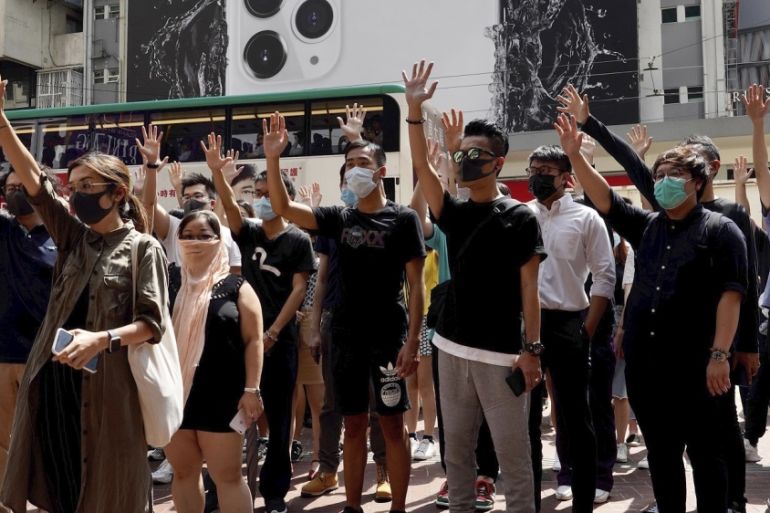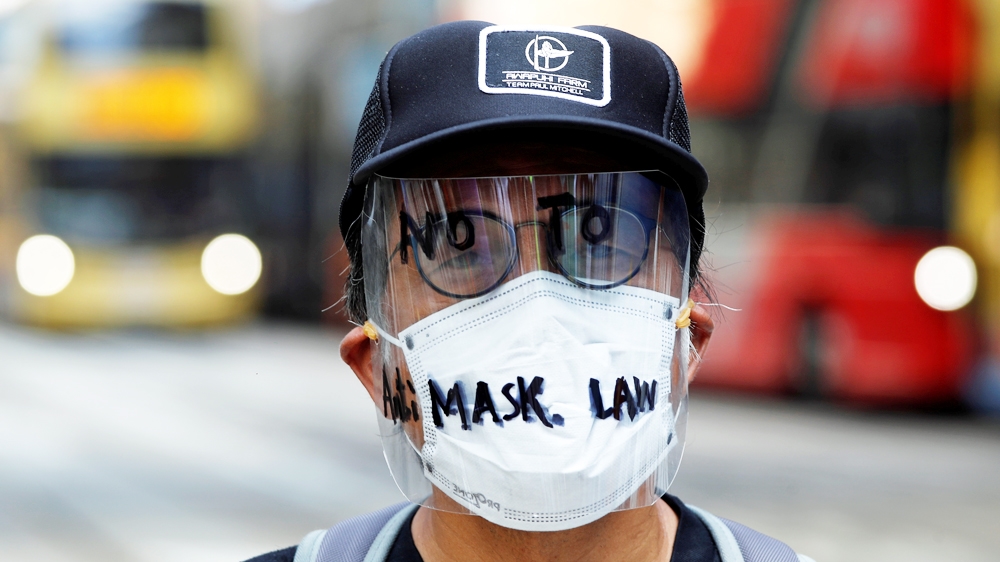Hong Kong moves to ban face masks as protests continue
Leader Carrie Lam invokes colonial-era emergency laws to introduce ban, bypassing the city’s legislature.

Embattled Hong Kong leader Carrie Lam invoked the use of emergency powers on Friday, allowing the government to ban face masks at protests, in an attempt to further clamp down on pro-democracy rallies that have rocked the city since June.
Lam said that the ban would take effect on Saturday, October 5. Reports said that the ban would take effect as early as midnight.
Keep reading
list of 4 itemsHong Kong’s new security law comes into force amid human rights concerns
Hong Kong passes tough new national security law
What is Article 23, Hong Kong’s new draconian national security law?
“Violence is destroying Hong Kong,” Lam said, adding that the ban of face masks would be an “effective deterrent”, as it would prevent protesters from “hiding their identity”.
While she clarified that the city is “not in a state of emergency”, the city’s chief executive also warned that “if the violence escalates, we will have to look at things we need to do to counter” the protests.
|
|
As Lam spoke, thousands of masked protesters marched in the streets of the city to express their opposition to her decision.
The demonstrators raised their arms and shouted pro-democracy slogans.
Seething public anger against Chinese rule in the semi-autonomous city has underscored increasingly violent confrontations between police officers and demonstrators.
Protesters have used face masks along with yellow helmets, goggles and respirators to protect themselves from tear gas, rubber-coated bullets and water cannon, and to avoid identification.
Pro-Beijing legislators have been urging Lam to introduce the emergency ordinance since Tuesday, when violent protests in Hong Kong overshadowed the 70th-anniversary celebrations for the founding of the People’s Republic of China.
“If we had the law … then this would have a deterrent effect on some people,” pro-Beijing legislator Elizabeth Quat told reporters on Thursday.
Nicholas Chan Hiu Fung, a member of the Chinese People’s Political Consultative Conference, said the move would allow people to share views in “an organised, proper, legal manner”.
Joshua Wong, secretary general of pro-democracy Demosisto party, warned that the ban of the use of masks only “marks the beginning” of more government repression.
#NOW – full text of the #antimask law #antielab pic.twitter.com/J5S2ZixrKZ
— Lok. (@sumlokkei) October 4, 2019
“More arbitrary arrest and search, extending detention to 96 hours or more, banning internet access, de facto martial laws are highly expected,” he wrote on social media.
On Friday afternoon, Hong Kong’s education bureau sent letters to schools warning students about using masks.
Al Jazeera’s Scott Heidler, reporting from Hong Kong, said that the latest order could likely backfire against the government.
He quoted protesters as saying that the ban would only harden their resolve to protest against the government.
It was not clear how the government would implement the mask ban in a city where many of its 7.4 million residents wore them daily to protect against infection following the outbreak of the deadly Severe Acute Respiratory Syndrome (SARS) in 2003.
Injured protester charged
Police fired a record 1,400 rounds of tear gas and used water cannon to break up Tuesday’s protests, which flared up in different parts of the city.
An 18-year-old protester was shot in the chest by a police officer after his unit was involved in a skirmish with protesters armed with pipes.

The secondary school student remains in hospital in a stable condition and was on Thursday among a number of people charged with rioting.
A couple of hundred people rallied outside court to show their support for the protesters, Al Jazeera’s Sarah Clarke said.
|
|
“Police are still under pressure about why they used live bullets, and why they targeted the protester’s chest,” she said.
Pro-democracy legislator Dennis Kwok said introducing an emergency law would signal “the beginning of a slip towards an authoritarian state”.
“The authorities by now should have listened to the Hong Kong people. Their yearning for freedom, liberty and democracy is not going to go away,” he said.
The protests were ignited by a now-scrapped plan to allow extraditions to the mainland.
But after Beijing and local leaders failed to respond to demonstrators’ demands the rallies snowballed into a wider movement calling for democratic freedom and police accountability.